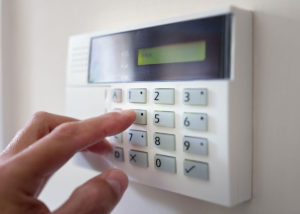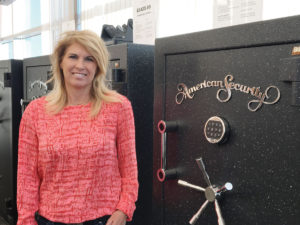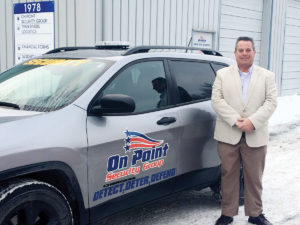5 ways to keep your small business protected
 There’s one thing experts agree upon: All businesses, even the smallest, should have a security plan in place as part of their regular business policies.
There’s one thing experts agree upon: All businesses, even the smallest, should have a security plan in place as part of their regular business policies.
“In a post-9-11 world, we have to be worried about everything,” says Dennis Herman, the operations manager
of On Point Security Group in Clive.
Just because a business is small doesn’t mean it’s immune to a burglary or another loss of its assets. Police officers and security guards agree that it is better to be safe than sorry, for individuals to be aware of their surroundings and to report suspicious behavior or situations.
“For a small business owner, I think it’s almost more important because they have fewer employees and more at
risk,” says Karen Goldsworth, sales manager for Strauss Security Solutions in Urbandale.
There is often less oversight within a small business because fewer people have more responsibilities, and security procedures could be overlooked, she says.
Here are five things to consider when creating your business’ security plan:
1. What steps do I need to take?

Create a list of security policies that will go into an overall security plan, law enforcement officers and security officials say. This plan — the primary focus is how to keep employees safe — will include a range of scenarios such as how to handle a disgruntled customer or a former employee who shows up at the office and becomes threatening, or what to do if a suspicious package is delivered to the office, and the actions to take as a result.
The plan will take into account employees’ lives and safety, as well as the physical assets of the business — the building, inventory and other supplies — and the cybersecurity, network and anything that pertains to the intellectual property of the business. There are both internal and external security risks, according to Business News Daily, a resource for small business owners.
Business owners can consult with a security assessment firm to receive professional help, Goldsworth says. A business owner may have a sense of what they need based on an incident that has occurred, or they may need more guidance from the security expert.
“A risk assessment is always a good idea,” says Herman with On Point. “When we have those conversations, we talk about the building itself, andwhere do you want to focus.”
This includes a discussion about entrances into the building and how they will be secured, as well as windows, fire escapes and the requirements the business owner must follow by law and city code. Next, comes an assessment of what is at risk and the value of it.
“Are you a small, craft store where you’re making things and selling them? Or are you a financial institution? What’s the likelihood that somebody is going to try to take what you have?” Herman says.
The evaluation will ensure the business protects the correct vulnerabilities and assets and installs an appropriate system to address those issues. Business owners may consider:
• Are they located in a neighborhood where there is crime or where activity occurs after hours such as an entertainment district or near a restaurant or retail store?
• Are visitor entries clearly identified?
• Do visitors have free-range access to all parts of the building, or do they have to check in?
• Are exterior doors not used as entry points kept locked?
• Are windows locked?
Some businesses may also consult with a professional security company that specializes in on-site security guards, patrol security and alarm response.
Businesses need to be prepared ahead of time, human resource experts say. Policies and procedures should be in place that include steps to keep the physical workplace safe, as well as a company’s employees and intellectual property.
This includes ensuring the appropriate amount of staff is present when an employee is terminated or hiring temporary security personnel if a firing is expected to become violent. A supervisor needs to escort the terminated employee to his or her desk to retrieve their personal belongings and to ensure there are no threats to other employees or damage or theft of company property.
A business’ security policies also will handle aspects of technology, specifically for terminated individuals, and include a plan for removing the person’s access to the network and email system and changing his or her access codes and passwords. A security assessment company can review a company’s cybersecurity policies and
procedures to look for gaps and create a response plan that will include protection of hardware and other equipment. A business owner should make sure all computers and devices have their own locks and are secure in case the business itself should be broken into, says Sgt. Mackenzie Sposeto with the Waukee Police Department.
It’s important that all employees know their role in the security plan and understand how they should respond to threats and how they will be notified if there is need to enact the plan.
2. Who is most affected?

Mackenzie Sposeto
More than 60 percent of burglaries occur after business hours or overnight, Sposeto says.
“Make sure there is some type of surveillance and that it’s visible,” she says.
Some aspects of security will vary by industry; however, most businesses could still benefit from an alarm system and security cameras, Herman says.
Construction companies use physical security guard services such as On Point to guard their sites to prevent tool theft and vandalism, as well as to protect the public from potential dangers such as open holes on the site, he says.
Construction companies also use surveillance equipment to view still pictures of people entering and leaving a worksite and to record their coming and going, Goldsworth says.
“Cameras on job sites has become very common,” she says.
There may be a time when a business undergoes remodeling or a new building is constructed. Crime and vandalism at sites can add more expense to a project and dig into profits. A site can be made more secure if all of the parties involved, including workers, adjoining property owners and law enforcement are aware of the work and asked to report suspicious activities or theft and asked to help keep watch. A fence around the site, nighttime lighting, lockable gates, no trespassing signs and a check-in and out system also can help secure the site.
If a former employee shows up on site and is causing problems, a business owner can notify the police. If the company knows it will be firing an employee, they can notify police in advance or request the help of a security company, security and law enforcement officials recommend.
“A lot of companies are good about being proactive and letting us know they have an employee who is upset, or they will be letting them go and want us to be aware,” Sposeto says. “If they don’t know, and they want an officer to be on standby, we’ve done that, too.”
Herman says his company responds to business clients who have terminated an employee, and that individual has then made threats against the business or the other employees.
“We’ve done many assignments like that where somebody might be a little — for lack of better term — off their rocker and has threatened to come back and shoot people,” he says. “That’s why they’ve chosen to have an armed guard in their presence.”
Another situation that any business needs to be prepared for is what to do if a suspicious package arrives at the office. Such packages often arrive with too much postage, no return address and excessive amounts of tape.
Businesses need to leave the package where it was and notify the police, Sposeto says, adding that the
department will involve the hazardous materials team or the fire department if necessary.
3. What type of system do I need?

Security procedures can be broken down into several areas: access control, a security system, physical monitoring of the site and communication of the plan.
Access to the building or site can be controlled with keys or access cards. It’s important to inventory keys and who has which key. There are systems, such as a high security cylinder, that make it impossible to duplicate keys.
“Not everybody should have a key to everything,” Herman says. “That’s when things have a tendency to grow legs and disappear.”
Part of the business’ security plan should include an inventory of who has which keys, Sposeto says.
If this is determined to not be adequate enough, the business can install an access card system to control who enters and leaves the building and to limit their entrance to specific times of day or days of the week.
A security system can be installed that is monitored by an outside company or automatically notifies emergency personnel if a situation occurs at the business. Be mindful of whom receives the code and change it anytime an employee leaves the company, as well as regularly change the locks on the building especially after it has switched ownership, Sposeto says.
An alarm system with a keypad can be installed to monitor particular areas or zones of a business. Security cameras add another level of security.
Sposeto says even if the camera is on a motion sensor, it can provide more protection.
“Then if something were to happen, we can go back and say: ‘Hey, what do you have? Do you have video footage?’ ” she says. “It makes our job a lot easier.”
A safe is another good measure for businesses to have, Sposeto says, as it helps the business protect cash on hand, important documents or other valuable information that needs to be kept on site.
“If they have all of those things in place, that really is going to cover just about anything as far as a security breach or being able to detect a security breach,” Goldsworth says.
A business owner or supervisor can play a role in security by walking around the site to keep an eye on what is happening. They should also encourage their employees to be observant while on the job and when arriving and leaving. Individuals who are not recognized should be questioned about their whereabouts, and any security cameras should be running at all times.
Another option would be to hire a security company that conducts building checks and responds to alarm calls, or even provides an employee on site for particular events, situations or at the front desk. Herman says a security
company will check a business’ doors several times a night, depending upon the client, and will ensure
individuals are not loitering in the parking lot or causing vandalism.
4. Can I afford this?
The cost of a security system will vary widely depending upon the options that are chosen. After a company purchases its equipment, it will also need to factor the cost of an alarm service. Goldsworth says this can run about $40 a month. A web-based card access solution also has a monthly fee attached to it depending upon
the number of doors to the business, and keys are purchased per number. Security cameras cost a minimum of $500 and will have additional costs if the business wants an outside source to monitor the footage.
Herman says the physical presence of a security officer often provides the best security. It can cost between $7 and $12 to have a security officer patrol a site depending on the number of stops. To hire an unarmed security
guard is about $25 an hour, while fees for an armed guard range between $30 and $50 an hour.
A safe can run from several hundreds of dollars to thousands depending upon its size and fire rating.
A security company also will respond to alarm calls for free — even those that are user error, Herman says. In West Des Moines, three or fewer false alarms per calendar year are free. Four is a $50 charge; and five or more per year are $100 for each occurrence.
Sposeto says business alarms automatically notify the police department when they are tripped, and the department immediately responds. There is no charge for response to false alarms, according to the police department.
5. Are there other options?
There are other steps companies can take to increase their security. If the business is not able to hire a security guard to monitor its front desk and check visitors in and out, the owner can place an employee at the front of the office or building who acts as a barrier between the public and the rest of the office.
Businesses also can call their local police department to file an extra watch request. In Waukee, police officers often conduct building checks to ensure doors are locked and the building is secure, Sposeto says. Most police departments will offer a similar service or do so upon request. Sposeto says extra watch requests are available for businesses that are going to be closed a minimum of five days.
Businesses owners can take many steps that cost little to no money to increase safety:
• Remind employees of security procedures and test them on what to do to keep policies fresh in their minds.
• Be mindful of how products are placed in store windows to discourage thieves.
• Keep doors and windows locked that are not in use.
• Check with your insurance company to see if installing an alarm or security system will provide a discount or other savings.
• Leave a light on, especially in a strip mall or an independent-standing store, or install a motion-sensor light, so there’s always visibility.
• Keep shrubbery and landscaping low, so it doesn’t block doors or windows or other places where intruders could hide or seek cover to break in, Sposeto says. “A lot of times if it’s an area that has a lot of forestry… it
might make it easily accessible and a target.”
• Install braces onto sliding doors to prevent them from being opened.
• Purchase heavy duty screens for windows that are more difficult to pop out and remove.
• Secure all egress or basement windows and ensure they are locked. ♦


superbeets
I’ve been surfing online more than three hours today, yet I never found any interesting article like yours. It is pretty worth enough for me. Personally, if all webmasters and bloggers made good content as you did, the web will be much more useful than ever before.|